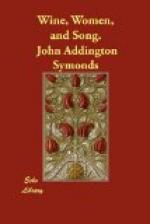Cupid, as was natural, settles the dispute of the two girls by deciding that scholars are more suitable for love than soldiers.
This would be the place to introduce another long descriptive poem, if the nature of its theme rendered it fit for translation. It relates the visit of a student to what he calls the Templum Veneris; in other words, to the house of a courtesan. Her attendants are sirens; and the whole poem, dealing with a vulgar incident, is conducted in this mock-heroic strain.[31]
FOOTNOTES:
[Footnote 31: Carmina Burana, p. 138.]
XVII.
We pass now to love-poems of a more purely personal kind. One of these, which is too long for translation and in some respects ill-suited to a modern taste, forms the proper transition from the descriptive to the lyrical section. It starts with phrases culled from hymns to the Virgin:—
“Si linguis angelicis
Loquar et humanis.”
“Ave formosissima,
Gemma pretiosa;
Ave decus virginum,
Virgo gloriosa!”
These waifs and strays of religious diction are curiously blent with romantic and classical allusions. The girl is addressed in the same breath as—
“Blanziflor et Helena,
Venus generosa.”
Toward the close of the poem, the lover, who at length has reached the object of his heart’s desire, breaks into this paean of victorious passion:—
“What more? Around
the maiden’s neck
My arms I flung
with yearning;
Upon her lips I gave and took
A thousand kisses
burning:
Again and yet again I cried,
With whispered
vows and sighing,
This, this alone, sure, sure
it was
For which my heart
was dying!
“Who is the man that
does not know
The sweets that
followed after?
My former pains, my sobs and
woe,
Were changed for
love and laughter:
The joys of Paradise were
ours
In overflowing
measure;
We tasted every shape of bliss
And every form
of pleasure.”
The next piece which I shall quote differs in some important respects from the general style adopted by the Goliardi in their love-poetry. It is written in rhyming or leonine hexameters, and is remarkable for its quaint play on names, conceived and executed in a truly medieval taste.
FLOS FLORAE.
No. 30.
Take thou this rose, O Rose!
the loves in the rose repose:
I with love of the rose am
caught at the winter’s close:
Take thou this flower, my
flower, and cherish it in thy bower:
Thou in thy beauty’s
power shalt lovelier blow each hour:
Gaze at the rose, and smile,
my rose, in mine eyes the while:
To thee the roses belong,
thy voice is the nightingale’s song:
Give thou the rose a kiss,
it blushes like thy mouth’s bliss:
Flowers in a picture seem
not flowers, but flowers in a dream:
Who paints the rose’s
bloom, paints not the rose’s perfume.




